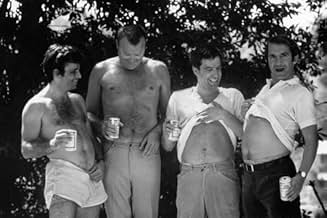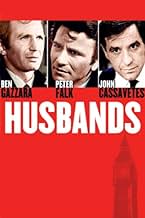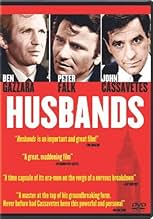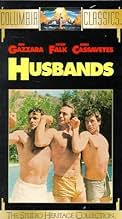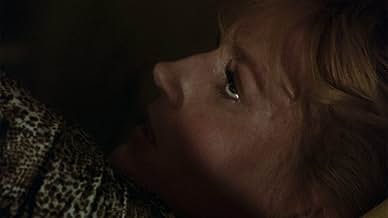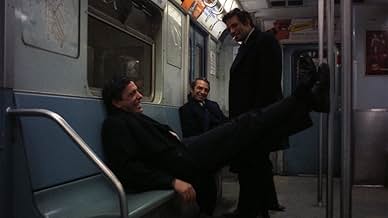Después de la muerte de un amigo en común, tres hombres casados abandonan sus vidas juntos en busca de placer y libertad y se van a Londres.Después de la muerte de un amigo en común, tres hombres casados abandonan sus vidas juntos en busca de placer y libertad y se van a Londres.Después de la muerte de un amigo en común, tres hombres casados abandonan sus vidas juntos en busca de placer y libertad y se van a Londres.
- Dirección
- Guionista
- Elenco
- Premios
- 1 nominación en total
- Annie
- (as Meta Shaw)
- 'Normandy' Singer
- (as Eleanor Gould)
- Dirección
- Guionista
- Todo el elenco y el equipo
- Producción, taquilla y más en IMDbPro
Opiniones destacadas
This film brings together John Cassavetes, Ben Gazzara and Peter Falk as actors on one screen. No other film has this trio, and here we have it in spades. That alone makes the film worth watching, because the way these guys interact is quite fun to watch.
Critic Jay Cocks wrote, "Husbands may be one of the best movies anyone will ever see. It is certainly the best movie anyone will ever live through." He described it as an important and great film, and as Cassavetes' finest work. Roger Ebert, on the other hand, disliked the film greatly (despite being a Cassavetes fan in general) and Pauline Kael described the movie as "infantile and offensive."
Cassavetes was one of our best and sorely underappreciated by most Americans. A real crime! It may seem long (especially the bar scene), but he didn't make ENTERTAINMENT as he so often said. He cared about people and relationships and their frustrations and disappointments. Don't miss this one!
¿Sabías que…?
- TriviaScreenwriter John Cassavetes wrote the film's dialogue after doing improvisations with actors Ben Gazzara and Peter Falk. Reportedly, Cassavetes built the film's three main central characterizations around the real-life personalities of the film's three main actors one of whom included himself.
- Citas
Archie Black: [Arriving at the funeral] I suppose this is proper, all these big cars and chauffeurs. Black shiny cars. Seems dopey for a guy like that. Well, I guess that's what they do. People get symbolic over death. They get very formal, and it's really ridiculous. Because it's probably the most humiliating thing in the world. But I feel very relaxed. People die of tensions. That's all they die of, Gus. That's the truth. Did you know that? I know it, and it's something I'm never gonna forget.
Gus Demetri: Don't believe truth. Just don't believe truth. Archie, I'm telling you, don't believe truth.
Archie Black: That is the truth now. You see, the truth will never kill you. Lies will. Not cigarettes, not alcohol. Lies, Gus. Lies and tensions. That'll kill you. That'll kill you before cancer in the heart. Did you know that?
- Créditos curiososThere are no closing credits and no "THE END" title card. The screen just goes black. In the opening credits, everyone involved in the film (even the "little people") are credited on two "tell all" title cards, right on down from the actors to the grips, a total of 82 credits.
- Versiones alternativasThe original theatrical release ran 154 minutes. The out-of-print VHS release from Columbia/Tristar runs 132 minutes.
- Bandas sonorasShow Me the Way to Go Home
(1925) (uncredited)
Written by Irving King
Sung a cappella by Ben Gazzara, Peter Falk and John Cassavetes
Selecciones populares
- How long is Husbands?Con tecnología de Alexa
Detalles
Taquilla
- Presupuesto
- USD 1,000,000 (estimado)
- Total a nivel mundial
- USD 3,170
Contribuir a esta página



